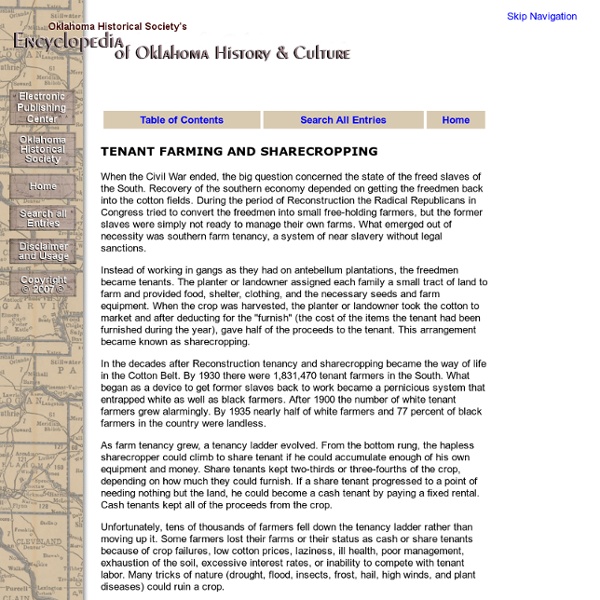Carpetbaggers & Scalawags - American Civil War
In general, the term “carpetbagger” refers to a traveler who arrives in a new region with only a satchel (or carpetbag) of possessions, and who attempts to profit from or gain control over his new surroundings, often against the will or consent of the original inhabitants. After 1865, a number of northerners moved to the South to purchase land, lease plantations or partner with down-and-out planters in the hopes of making money from cotton. At first they were welcomed, as southerners saw the need for northern capital and investment to get the devastated region back on its feet. They later became an object of much scorn, as many southerners saw them as low-class and opportunistic newcomers seeking to get rich on their misfortune.
Sharecropping
Sharecropping was an agricultural labor system that developed in Georgia and throughout the South following Reconstruction and lasted until the mid-twentieth century. Under this arrangement, laborers with no land of their own worked on farm plots owned by others, and at the end of the season landowners paid workers a share of the crop. Origins
14th Amendment
Amendment XIV Section 1. All persons born or naturalized in the United States, and subject to the jurisdiction thereof, are citizens of the United States and of the state wherein they reside.
Carpetbaggers
With the rapid expansion of railroads in the 1840’s and 1850’s . Ordinary people were traveling in large numbers, and there was an need for cheap luggage ,so thousands of carpetbags were manufactured. They were made by saddle makers in many town and cities and were many sizes and shape.
<i>The Doom of Reconstruction: The Liberal Republicans in the Civil War Era</i>
Find using OpenURL The Doom of Reconstruction: The Liberal Republicans in the Civil War Era (review) In lieu of an abstract, here is a brief excerpt of the content:
Reconstruction: The Second Civil War
The Civil Rights Act of 1866 granted citizenship and the same rights enjoyed by white citizens to all male persons in the United States "without distinction of race or color, or previous condition of slavery or involuntary servitude." President Andrew Johnson's veto of the bill was overturned by a two-thirds majority in both houses of Congress, and the bill became law. Johnson's attitude contributed the growth of the Radical Republican movement, which favored increased intervention in the South and more aid to former slaves, and ultimately to Johnson's impeachment. 1866 Civil Rights Act 14 Stat. 27-30, April 9, 1866 A.D.
WGBH American Experience . U.S. Grant: Warrior . Passage of the Fifteenth Amendment
Harper's Weekly Magazine An illustration of blacks in line to vote At the time of Ulysses S. Grant's election to the presidency in 1868, Americans were struggling to reconstruct a nation torn apart by war. Voting rights for freed blacks proved a big problem. Reconstruction Acts passed after the war called for black suffrage in the Southern states, but many felt the approach unfair.
US House of Representatives: History, Art & Archives
Image courtesy of Library of CongressA New York state politician for more than a decade, Representative Henry Raymond served only one term in the House of Representatives.
Fifteenth Amendment
Passed by Congress February 26, 1869, and ratified February 3, 1870, the 15th amendment granted African American men the right to vote. To former abolitionists and to the Radical Republicans in Congress who fashioned Reconstruction after the Civil War, the 15th amendment, enacted in 1870, appeared to signify the fulfillment of all promises to African Americans. Set free by the 13th amendment, with citizenship guaranteed by the 14th amendment, black males were given the vote by the 15th amendment. From that point on, the freedmen were generally expected to fend for themselves.
Civil Rights Act of 1866 Facts, information, pictures
Christopher A. Bracey The Civil Rights Act of 1866 (14 Stat. 27) was a momentous chapter in the development of civic equality for newly emancipated blacks in the years following the Civil War. The act accomplished three primary objectives designed to integrate blacks into mainstream American society. First, the act proclaimed "that all persons born in the United States ... are hereby declared to be citizens of the United States."
Reconstruction - American Civil War
At the outset of the Civil War, to the dismay of the more radical abolitionists in the North, President Abraham Lincoln did not make abolition of slavery a goal of the Union war effort. To do so, he feared, would drive the border slave states still loyal to the Union into the Confederacy and anger more conservative northerners. By the summer of 1862, however, the slaves themselves had pushed the issue, heading by the thousands to the Union lines as Lincoln’s troops marched through the South.
Liberal Republicans—They're Alive!
Until not long ago, we tended to think of Republicans as unified and focused, and Democrats as inherently fractious (see, for instance, the evergreen "Dems In Disarray" headline). These days the opposite is true—or at least it's the case that Republicans have become just as divided as Democrats. But how much of that is about Washington infighting and intraparty struggles for power, and how much is actually substantive and matters to voters? This post from The Upshot at the New York Times has some provocative hints. Using polling data from February that tested opinions on a range of issues, they found that Republicans are much less unified than Democrats when it comes to their opinions on policy:



